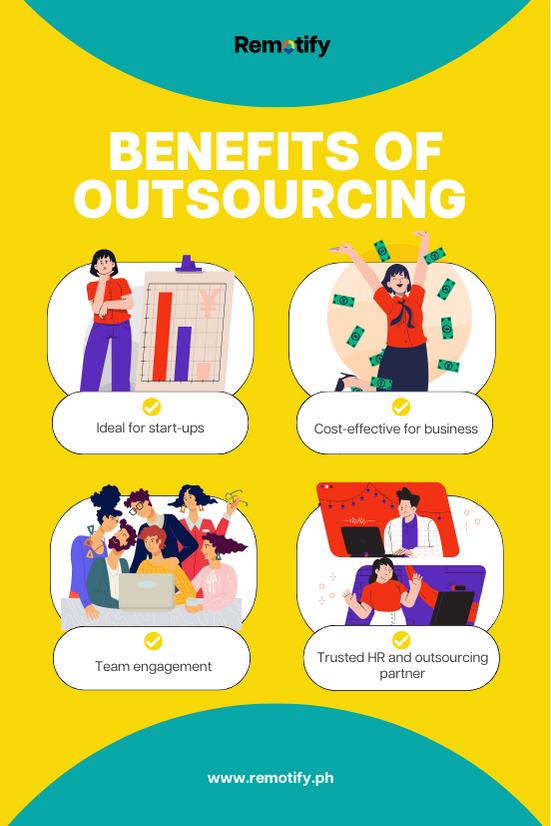Every day, there are thousands of start-up companies sprouting up worldwide but only a fraction of them are lucky enough to stay in their industry. Some lack a validated market demand, some do not have a competitive business model, and some are assembling the wrong team which all lead to a waste of time and money. But, one of the major obstacles start-ups face is having ineffective talent acquisition processes that may cause internal issues in the long run. So, what is outsourcing and how does it help companies?
While some say that outsourcing is only for large corporations and companies, that is actually incorrect. Acquiring employees with different expertise through outsourcing will be highly beneficial to a start-up business where everything is still at the establishing phase. However, it is important to understand how outsourcing solutions work to ensure your success.
What is outsourcing and why should you try it?
Even if you have the best idea and plan for your business, realizing it wouldn’t be possible without any help from your skilled employees. Launching a product is not only about utilizing and improving your offer, you should also have employees who are experts in marketing, branding, human resources, technology, and art to make your company successful.
However, if you don’t have enough budget and only rely on your personal savings to start your business, chances are you can only afford a few employees.
In this case, it is ideal to find outsourcing solutions across business areas and this is made possible with several organizations and online hiring websites available. According to Cogneesol, about 82% of companies that used outsourcing say that it improves their overall management. This proves the benefits that businesses can get by hiring outsourced employees.
In addition, there are other benefits from implementing a remote work setup start-ups can get. Outsourcing can offer companies a larger pool of talents without geographical boundaries and may even help cut costs. If you are residing in the U.S. or Australia and you hire remote workers from Asia, you can save up to more than half of your usual local manpower costs while maintaining the same quality of services.
Benefits of Outsourcing for Startups

Outsourcing is a great way for startups to save costs while simultaneously free up time and resources. It can also provide access to more expertise than may otherwise be available in-house, allowing startups to scale their projects quickly and efficiently. Additionally, outsourcing gives startups the opportunity to tap into international talent pools with different skill sets, languages, cultures, and backgrounds that could be beneficial to their operations.
Outsourcing Cost Savings
Besides providing access to multiple talent pools, outsourcing can also help startups save money over the long run by allowing them to outsource services and tasks that would otherwise require additional in-house team members. This can be especially helpful for startups that are just getting off the ground and may not have the necessary funds.
A. Labor Costs
Startups can save on labor costs by outsourcing tasks or services to firms that often charge much less than in-house staff. This means startups don’t have to hire and pay for additional team members, saving them money in the long run.
B. Infrastructure Costs
By outsourcing, startups can also save money on infrastructure costs that would otherwise be necessary for in-house team members. This includes things like office space and equipment which can add up quickly. At Remotify, we do provide our clients with the option of purchasing equipment from us as well, but by outsourcing these services, startups can keep their overhead low and maximize profits.
C. Other Cost Advantages of Outsourcing
Outsourcing can also provide access to economies of scale, meaning startups can tap into global resources and benefit from lower costs associated with bulk orders. Additionally, many outsourcing companies offer various payment plans that could be more beneficial for startups than full upfront payments.
What to outsource
Before you outsource your business functions, it is important to understand and carefully plan how your start-up operates and what needs to be done. You should also determine the back and front office functions and processes of your company to know which tasks are best to outsource. For example, if you are in the SAAS industry, complex and confidential software designing tasks should be delegated to trusted employees who are bound within a contract. This makes secure hiring processes very important for hiring outsourced employees. Meanwhile, other tasks that are not in the nature of business like payroll services and accounting are also ideal to outsource.

There are three general categories of tasks that companies should look into when considering to outsource. Understanding them would be beneficial to choose the right business functions that you could outsource without having to compromise the quality of your services and the credibility of your business.
Here are the three categories of outsourced positions:
Highly skilled, or executive, expertise
Hiring executive-level candidates as your in-house employee would mean that you need to pay a higher salary for them. This is why most start-ups prefer to outsource most of their CFO-level tasks in other countries with lower costs of living than theirs. This way, they can save more without worrying about the expertise and skills of their employees.
Specialized knowledge
For every business, there are a lot of aspects that you need to work on to make everything perfect, more critically so for start-ups. However, if you need specialized knowledge like IT support and legal assistance, it would be best to outsource an in-house employee. This is more affordable and more convenient to work with.
Highly repetitive tasks
Highly repetitive tasks are not only tedious but can also be time-consuming. This makes tasks such as data entry accounts payable and shipping inventory ideal for outsourcing. If you hire remote workers from Asian countries like the Philippines, more than having a detail-oriented team to look after data/accounts, you can have a dedicated team at a much lower rate than your usual local hiring costs.
Challenges and Considerations when Outsourcing for Startups
There are some challenges and considerations when it comes to outsourcing for startups. It is important to have a clear understanding of what goals need to be achieved before starting the process of outsourcing, and how these goals can realistically be met. Additionally, there may also be legal or compliance issues that need to be considered when working with overseas vendors.
Best Practices
A. Quality Assurance
It is important to always ensure that the services being outsourced meet the expected quality standards. This means doing research on potential vendors and regularly checking in with them throughout the process. Additionally, startups should communicate their expectations clearly to avoid miscommunication or misunderstandings.
B. Scalability for Growth
In order to ensure scalability for future growth, startups should consider vendors that can provide easy scaling of services as needed. This way, startups can easily add resources or reduce costs as necessary without needing to go through the entire process again from scratch.
C. International Options
When it comes to international outsourcing, startups should take the time to research different options and decide on what is best for their situation. They should also consider the legal and compliance issues associated with working in various countries before making any final decisions.
How to outsource through EOR
When planning to outsource, finding the ideal way to source and connect with highly skilled talents is important. While it is tempting to just hire workers through a BPO or freelance site, there is actually a more convenient and effective outsourcing solution: Employer of Record (EOR).
You can learn more about the pros and cons of outsourcing through BPO and EOR in this article.
According to Wasp Barcode Technologies, the five biggest challenges that small businesses face are related to employee management and profit. The problem is, with BPO and freelancers, it will not be easy to lead and manage your outsourced employees. BPO companies follow their own management and freelancers are, well, not really your employees. They can easily drop your projects anytime unless otherwise is stated by your contract.

As a solution, most companies choose to outsource through an employer of record(EOR) company like Remotify. We serve as the local employer of your outsourced employees which makes legal compliance much easier. We can also handle the entire outsourcing process from the sourcing, hiring, up to monthly payroll management but will let you handle the day-to-day tasks of your employees.
Moreover, we offer ongoing support for clients in areas such as team engagement to assess the performance of the outsourced employees and make improvements easier. We also have optional services such as conducting background checks for new or existing employees, GDPR and cybersecurity training, HMO and other benefits, and laptop procurement.
With us, managing and instilling your company culture to your employees as a start-up is much easier. You will also have more time for other business functions that you need to focus on.
Ideal for Start-ups
Outsourcing talents from other countries is ideal for start-ups who are tight on budget but need a high level of talent. This will let you build a highly skilled team without the expense of hiring local in-house employees. There are also a variety of business functions that you can hire remote workers for.
Moreover, you can make the most of advanced outsourcing solutions such as EOR companies that can help you with sourcing, HR tasks, payroll management, legal compliance, team engagement. With a proper business plan, enough dedication, and strong teamwork, your start-up will surely be a success in no time.
If you want to know more about how we can help you outsource talents for your start-up, you can check out Our Services.
Conclusion
Outsourcing is a great way for startups to access specialized skill sets and cost savings. This guide has provided an overview of the benefits, challenges, and considerations associated with outsourcing, as well as best practices on quality assurance, scalability, and international options available when outsourcing work. Additionally, it discussed how Employer of Record can help you in outsourcing. By taking advantage of these resources and following the tips outlined in this guide, you’ll be able to maximize your chances of success with outsourcing. With the right strategies in place, you can save money and free up resources that would otherwise have been tied up in expensive operations. So go ahead and explore all the options available to you – make use of this invaluable tool and reap the benefits of outsourcing for your startup!
FAQs
Q: What are the key benefits of outsourcing for startups?
A: The key benefits include cost savings, access to specialized skillsets, scalability and quality assurance.
Q: How Employer of Record can Help Startups with Outsourcing
A: For startups looking to outsource work, they may need assistance in managing the legal and compliance aspects of doing so. Employer of record is a service that provides companies with help managing the administrative side of hiring and onboarding workers. They are able to assist with payroll processing, tax filing, employee benefits, health and safety regulations, and more.
Q: How can I maximize my chances of success when outsourcing?
A: To maximize your chances of success, you should ensure that you have a clear strategy in place before beginning the process. You should also research potential vendors thoroughly and evaluate their past performance. Additionally, make use of Employer of Record services where appropriate. This will help to streamline operations and provide additional legal protection. Look for a supplier that can be a proper strategic HR partner on the ground for you.
Q: Is direct hiring more affordable or outsourcing for a startup company?
A: Generally, outsourcing is more cost effective for startups as it eliminates the need to invest in infrastructure and other overhead costs. Additionally, outsourcing gives you access to specialized skillsets that may otherwise be difficult or expensive to find. However, depending on the nature of your business, direct hiring may also be a viable option. It’s important to consider all factors before making a decision.
Q: What are some common challenges when outsourcing?
A: Some common challenges include language barriers, cultural differences, quality control issues and legal complications. It’s important to do thorough research into potential vendors before committing to any arrangement in order to reduce these risks as much as possible.
Highlight
- Outsourcing is an effective way for startups to access specialized skill sets and cost savings.
- This guide provided an overview of the benefits, challenges, and considerations associated with outsourcing.
- Best practices such as quality assurance, scalability, and international options available when outsourcing work should be taken into account.
- Employer of Record services can help manage all aspects of your outsourced workforce quickly and conveniently.
- To maximize chances of success when outsourcing, a clear strategy must be in place and vendors should be thoroughly researched before committing to any arrangement.
- Common challenges include language barriers, cultural differences, quality control issues and legal complications which should be taken into consideration.
Jump straight to a key chapter
Spending Too
Much Time
Onboarding?
your remote hiring in the
Philippines, excellently.
Say Goodbye to High Costs!
Request Your Free Consultation Today andSave a Massive 70% on Your Workforce!

Ready to thrive in a remote-first work environment?



